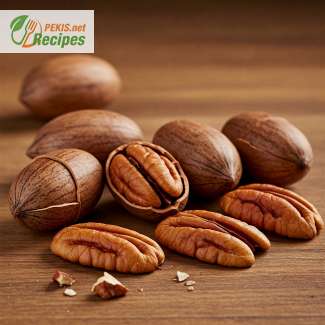
The Ultimate Guide to Pecan: Benefits, Uses, Nutrition, and Growing Tips
What is Pecan?
Pecan (Carya illinoinensis) is a deciduous tree native to North America, particularly found in the southern United States and Mexico. It produces pecan nuts, which are highly valued for their buttery flavor, rich nutritional profile, and versatility in cooking. Pecans belong to the hickory family and are among the most commercially significant tree nuts globally.
The pecan nut is enclosed in a smooth, brown shell that splits open when ripe, revealing an edible kernel with a deep golden-brown color. These nuts have a sweet and nutty taste, with a slightly oily texture, making them a favored ingredient in both sweet and savory dishes.
Characteristics of Pecan
Pecan Tree Features
- Height and Longevity: Pecan trees can reach up to 40 meters (130 feet) in height and can live for over 300 years.
- Leaves and Appearance: The trees have long, compound leaves that provide a dense canopy, offering excellent shade.
- Growth Conditions: They require warm climates, deep soil, and long growing seasons to thrive.
- Flowering and Pollination: Pecans are wind-pollinated and require cross-pollination with another pecan variety for optimal nut production.
Nut Characteristics
- Hard, Oval Shell: The shell is smooth and brown, splitting open naturally when the nut is ripe.
- Golden-Brown Kernel: Inside the shell, the pecan kernel has a rich, warm color.
- Oil Content: Pecans have high oil content, making them perishable if not stored correctly.
Why Are Pecans Used?
Pecans are widely used in culinary, medicinal, and industrial applications due to their nutritional benefits, rich flavor, and economic importance.
Culinary Uses
- Baking: Essential in classic desserts like pecan pie, cakes, cookies, and pastries.
- Savory Dishes: Often added to salads, roasted vegetables, meat dishes, and grain-based meals.
- Snacking: Consumed raw, roasted, or seasoned as a nutritious snack.
- Dairy Alternatives: Used in pecan milk, butter, and spreads as a plant-based option.
- Confectionery: Commonly used in candied pecans, pralines, and chocolate-covered treats.
Industrial and Commercial Uses
- Pecan Oil: Used in cosmetic products due to its moisturizing and antioxidant properties.
- Wood Industry: Pecan wood is strong, durable, and often used in furniture-making and smoking meats.
- Essential Oils and Extracts: Extracts from pecans are used in flavors, fragrances, and health supplements.
How Do Pecans Work?
Pecans are packed with healthy fats, proteins, fiber, and essential vitamins, providing long-lasting energy and numerous health benefits.
- High in Monounsaturated Fats: These healthy fats help lower bad cholesterol and promote heart health.
- Rich in Fiber: Aids in digestion, gut health, and weight management.
- Excellent Protein Source: Ideal for vegetarians and vegans as a plant-based protein.
- Loaded with Antioxidants: Protects the body from oxidative stress and chronic diseases.
- Supports Brain Function: Contains omega-3 fatty acids and vitamin E, which enhance memory and cognitive function.
Why Are Pecans So Good for Cooking?
Pecans are one of the most versatile nuts used in cooking and baking. Their natural sweetness and buttery texture make them a favorite in many recipes.
- Enhances Flavor: The rich, nutty taste complements both sweet and savory dishes.
- Adds Crunch: Roasted pecans provide a satisfying texture to meals.
- Healthy Alternative: A great substitute for less healthy fats in recipes.
- Pairs Well with Other Ingredients: Works well with chocolate, caramel, fruits, and spices.
Health Benefits of Pecans
Pecans offer a range of health benefits, making them an excellent addition to a balanced diet.
- Supports Heart Health: The monounsaturated fats help reduce bad cholesterol and lower the risk of cardiovascular diseases.
- Boosts Brain Function: Rich in omega-3s, vitamin E, and antioxidants, pecans support memory and cognitive health.
- Regulates Blood Sugar: Helps stabilize glucose levels, making them beneficial for diabetics.
- Promotes Digestive Health: The fiber content supports a healthy digestive system.
- Aids in Weight Management: Keeps you full longer, reducing unhealthy snacking.
- Reduces Inflammation: High in anti-inflammatory compounds that combat chronic diseases.
Growing and Harvesting Pecans
Ideal Growing Conditions
- Climate: Prefers warm, temperate climates with long growing seasons.
- Soil: Requires deep, well-drained soil rich in nutrients.
- Sunlight: Needs full sun exposure for optimal nut production.
- Watering: Requires consistent watering, especially during the nut development stage.
Harvesting Process
- Maturity: Pecan trees take 6–10 years to produce nuts.
- Nut Collection: The nuts fall naturally when ripe and are collected manually or with harvesting machines.
- Drying and Storage: Must be properly dried and stored to prevent rancidity.
Nutritional Values of Pecans (Per 100g)
- Calories: 691 kcal
- Carbohydrates: 14 g
- Proteins: 9 g
- Fiber: 9.6 g
- Total Fat: 72 g
- Saturated Fat: 6.2 g
- Monounsaturated Fat: 40 g
- Polyunsaturated Fat: 21 g
- Cholesterol: 0 mg
- Sodium: 0 mg
- Sugar: 4 g
Vitamins in Pecans
- Vitamin A: Supports eye health and immune function.
- Vitamin E: Acts as an antioxidant, protecting cells from damage.
- B Vitamins: Boost energy production and brain function.
- Folate: Essential for DNA synthesis and cell growth.
Pecans are not just delicious, but they also offer remarkable health benefits and culinary versatility. They are a rich source of healthy fats, antioxidants, and essential nutrients, making them a valuable addition to any diet.
Whether enjoyed raw, roasted, in desserts, or as part of savory dishes, pecans remain one of the most nutritious and flavorful nuts. With their long shelf life and multiple health benefits, they are an excellent investment for both home cooks and food manufacturers.
If you’re considering growing pecans at home, they require patience and proper care, but the rewards of harvesting your own fresh, organic pecans are well worth the effort.
By incorporating pecans into your daily diet, you can enjoy their delightful taste and powerful health benefits for years to come!